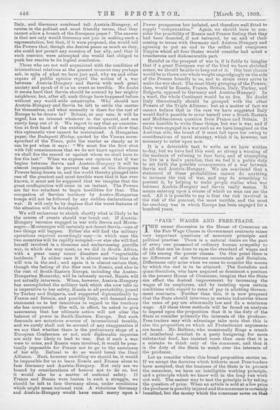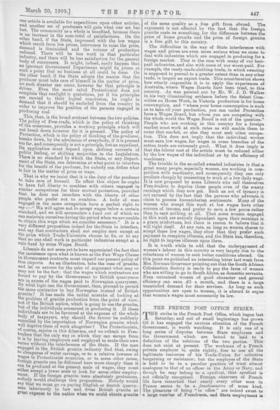"FAIR" WAGES AND FREE-TRADE. T HE recent discussion in the House
of Commons on the Fair Wage Clause in Government contracts raises very important questions of economic principle and political practise. There is ii natural desire on the part of every one possessed of ordinary human sympathy to do all that can be done to raise the standard of wages and of life among the poorer classes. On this point there is no difference of aim between economists and Socialists. Differences only arise when we come to consider the means by which the end is to be attained. The Socialists and quasi-Socialists, who have acquired so dominant a position in the present House of Commons, imagine that the State can effect the desired improvement by increasing the wages of its employees, and by insisting upon certain conditions with regard to rates of pay in allotting Govern- ment contracts. Further than this, it is now proposed that the State should intervene in certain industries where the rates of pay are abnormally low and fix a minimum wage. All these three methods will be found on analysis to depend upon the proposition that it is the duty of the State to consider primarily the interests of the producer. Free-traders may with advantage take note that this is also the proposition on which all Protectionist arguments are based. Mr. Balfour, who occasionally flings a crumb of intellectual comfort to a party hungering for more substantial food, has insisted more than once that it is a mistake to think only of the consumer, and that it is the duty of the State to watch over the interests of the producer.
Let us consider where this broad proposition carries us. If we accept the doctrine which hitherto most Free-traders have accepted, that the business of the State is to protect the consumer, we have an intelligible working principle, and a principle which we know will in the long run work out well. The easiest way to test the principle is by taking tbe question of price. When an article is sold at a low price the producer is possibly injured and the consumer is certainly benefited, but the naoney which the consumer saves on that one article is available for expenditure upon other articles, and another set of producers will gain what one set has lost. The community as a whole is benefited, because there iE an increase in the sum-total of satisfactions. On the other hand, if the State, impressed with the low wages which result from low prices, intervenes to raise the price, demand is diminished and the volume of production reduced. There will be less work in that particular industry, and there will be less satisfaction for the general body of consumers. It might, indeed, easily happen that an ignorant Government Department might fix prices at such a point that no business at all could be done. On the other hand, if the State adopts the maxim that the producer must take care of himself in the matter of price, no such disaster can occur, however far that principle is driven. Even the most rabid Protectionist does not complain that sunlight is gratuitous, yet if his principles are carried to their logical conclusion, he ought to demand that it should be excluded from the country in order to improve the position of the persons engaged in producing coal.
This, then, is the broad contrast between the two policies. The policy of Free-trade, which is the policy of thinking of the consumer, provides a working principle which will not break down however far it is pressed. The policy of Protection, which is the policy of thinking of the producer, breaks down, by the admission of everybody, if it is pressed too far, and consequently is not a principle, but an expedient. Its application must depend upon shifting currents of public feeling, or shifting majorities in the Legislature. There is no standard by which the State, or any Depart- ment of the State, can determine at what point to interfere for the benefit of the producer, for nobody can define what is fair in the matter of price or wage.
That is why we insist that it is the duty of the producer to take care of himself. To effect this object he ought to have full liberty to combine with others engaged in similar occupations for their mutual protection, provided that he does not interfere with the liberty of other People who prefer not to combine. A body of men engaged in the same occupation have a perfect right to say :—" We will agree not to accept wages below a certain standard, and we will accumulate a fund out of which we can maintain ourselves during the period when we are unable te obtain this wage which we consider necessary." It is a very different proposition indeed for the State to interfere, and say that contractors shall not employ men except at the price which Trade-Unionists choose to fix, or to say that no one shall work in particular industries except at a rate fixed by some Wages Board.
Liberals do not seem yet to have appreciated the fact that the insistence upon what is known as the Fair Wage Clause in Government contracts must imperil our present policy of free imports. As an illustration, take the ease of granite, and, let us assume for the sake of argument what may or may not be the fact : that the wages which contractors are forced to pay by the Government to British quarrymen are in excess of the wages paid to Norwegian quarrymen. 13), what logic can the Government, then, proceed to permit the same contractor to buy Norwegian instead of British granite? It has made the initial mistake of looking at the problem of granite production from the point of view, not of the British nation, whioh is going to use the granite, but of the individuals concerned in producing it. If these individuals are to be favoured at the expense of the whole body of taxpayers, why Ethould the favour be suddenly cancelled by the importation of Norwegian granite which will deprive them of work altogether ? The Protectionists, of course, rejoice in this dilemma, and we submit to Free- tradera that the only way in which they can escape from it is by leaving employers and employed to make their own terms without the interference of the State. If the men engaged in tho British granite industry find that, owing to cheapness of water carriage, or to a relative lowness of wages mu Protectionist countries, or to some other cause, foreign granite can be delivered here more cheaply than it Can be produced at the present scale of wages, they must either accept a lower scale or look for some other employ- ment. If the foreign granite were absolutely gratuitous, nobody would challenge this proposition. Nobody would say that we must go on paying English or Scotch quarry- men laboriously to hew and dress British granite at greet expense to the nation when we eould, obtain granite of the same quality as a free gift from abroad. The argument is not affected by the fact that the foreign granite costs us something, for the difference between the price of home granite and the price of foreign granite is a free gift to this country.
The difficulties in the way of State interference with wages and prices are even more serious when we come to deal with industries which are engaged in producing for a foreign market. That is the case with many of our best- paid industries, and also with some of our worst-paid. For example, the ready-made-clothing trade, in which sweating is supposed to prevail to a greater extent than in any other trade, is largely an export trade. This consideration shows how utterly impossible it is to apply the experiences of Australia, where Wages Boards have been tried, to this country. As was pointed out by Mr. W. J. D. Walker in his very illuminating evidence before the Select Com- mittee on Houle Work, in Victoria production is for home consumption, and "where your home consumption is such as to take all your production, you can under Protection have a, Wages Board, but where you are competing with the whole world the Wages Board is out of the question." People who are working in this country for a foreign market must work at such rates as will enable them to enter that market, or else they must seek other occupa- tion. This does not imply that the individual worker must earn low wages, for wages in some branches of the cotton trade are extremely good. What it does imply is that the labour cost of the article must be reduced either by the low wages of the individual or by the efficiency of machinery.
The trouble in the so-called sweated industries is that a great many people, especially women, are working in com- petition with machinery, and consequently they can only produce cheaply by consenting to work at a low daily wage. It is now proposed by some Liberals who call themselves Free-traders to deprive these people even of the scanty earnings which they now get. Such an act of tyranny is not excused by the fact that the persons who advocate it claim to possess humanitarian sentiments. Many of the women who accept this work at low wages have other sources of income, and prefer to earn a few pence rather than to earn nothing at all. That some women engaged in this work are entirely dependent upon their earnings is a grave misfortune, but there is reason to believe that it will right itself. At any rate, as long as women choose to accept these low wages, they show that they prefer such payment to complete idleness, and the State has, therefore, no right to impose idleness upon them.
It is worth while to add that the underpayment of women's labour in this country is very largely due to the reluctance of women to seek better conditions abroad. On this point we published an interesting letter last week from Mrs. Norman Grosvenor pointing out that the South African Colonisation Society is ready to pay the fares of women who are willing to go to South Africa as domestic servants. Even untrained women of good character and general efficiency can earn £3 a month, and there is a large unsatisfied demand for their services. As long as such opportunities are open to women, it is absurd to argue that women's wages must necessarily be low.











































 Previous page
Previous page